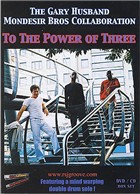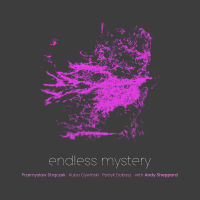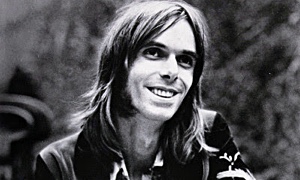Home » Jazz Articles » Film Review » Gary Husband/Mondesir Brothers Collaboration: To the Pow...
Gary Husband/Mondesir Brothers Collaboration: To the Power of Three
While the energy is clearly fusion, and there are plenty of tricky time signatures played with effortless ease, and the kind of intensity that most fusion fans expect, there's also a broader aesthetic at work.
 The Gary Husband/Mondesir Brothers Collaboration
The Gary Husband/Mondesir Brothers CollaborationTo the Power of Three
RSJ Groove Productions
2003
As time progresses, the true strength and diversity of drummer/keyboardist Gary Husband becomes increasingly evident. Whether contributing powerhouse drum work to legendary guitarist Allan Holdsworth's records, drums and keyboards to projects by drummer Billy Cobham and British pop group Level 42, or releasing his own projects, which include the solo piano disc, The Things I See: Interpretations of the Music of Allan Holdsworth, the more eclectic and jazz-oriented Aspire, or collaborating with trumpeter Randy Brecker, keyboardist Jim Beard, bassist Matthew Garrison and legendary Mahavishnu Orchestra violinist Jerry Goodman with the band Force Majeure (check out their recent live DVD, Gary Husband's Force Majeure: Live at the Queen Elizabeth Hall, London), Husband is clearly the kind of artist who can tackle virtually anything.
Drummer Mark Mondesir has made a name on the British scene, recording with artists including saxophonist Courtney Pine, guitarists Kevin Eubanks and John McLaughlin, and composer/arranger/bandleader Michael Gibbs. He's another stylistically-broad player, with the ability to effortlessly navigate challenging charts filled with constantly shifting time signatures, yet always able to find the groove that ties such complex forms together. Bassist Mike Mondesir, Mark's brother, has been the anchor for such artists as pianist/horn player Django Bates, Cobham and saxophonist Tim Berne. Both brothers possess the kind of imagination to play everything from strictly structured music to freer forms. While they haven't recorded together previously, they've spent a lot of time wood shedding together, developing a virtuoso-based style that, while relying on technical ability, doesn't neglect the concepts of space and simplicity. It's a matter of determining what the song demands; not approaching every piece with the same musical concept.
And so, in 2003, producer/director Steve Bingle of RSJ Groove Productions put Husband together with the Mondesir brothers with few, if any, precepts other than to pursue exactly what they wanted within the controlled confines of a recording studio where, in addition to having full control over the recording process, they could also have full creative control over the final mix down and, therefore, the final sonics. The result, To the Power of Three, is a hard-hitting fusion record with Husband on a variety of keyboards (and, at one point, on the drum kit in a furious workout with Mark). But while the energy is clearly fusion, and there are plenty of tricky time signatures played with effortless ease, and the kind of intensity that most fusion fans expect, there's also a broader aesthetic at work.
Husband's "Avatar (for John McLaughlin)" may be filled with the kind of virtuosity, directness and rapid-fire exchanges that one would expect '" the trading fours section of the piece between Husband and Mark Mondesir is nothing short of staggering '" there is also a different philosophy at work, allowing for greater space and subtlety. Miles Davis' "Jean Pierre" is, perhaps, even darker and more sinister than any of Miles' various recorded versions. And it shows that, while the Mondesirs may have a taste for more expansive playing, they're equally capable of laying down a simple, effective groove.
Along with two tunes by Husband and one by Mike Mondesir, the trio tackle the aforementioned "Jean Pierre," the oft-covered standard "Softly, As in a Morning Sunrise," but with a more loose and energetic disposition, as well as an obscure tune by ex-Mahavishnu Orchestra keyboardist Jan Hammer, "Smoke in the Sun," from a 1975 date by drummer Elvin Jones that proves this trio, in addition to all those odd meters and funky grooves, can swing as well.
Interspersed between the performances are conversations with the players, revealing something about their backgrounds, and what they are trying to do with this session. While these conversations break up the flow of the performance, it's possible to play the individual tracks without them; a great feature, since once you've heard the interviews once, you may not feel a need to hear them again, while the music...well, that definitely bears many repeat listens/viewings.
Given the control possible in a studio environment, the audio and video quality is superb. Multiple cameras allow you to see exactly what is happening everywhere on the soundstage, and the images are crisp, the sound excellent.
As a bonus, the DVD comes with two bonus tracks in the "Special Features" section: another Mark Mondesir composition, "Reciprocation," which features an incredible two-drum kit workout between Husband and Mark Mondesir; an alternate take of "Softly, As in a Morning Sunrise," and a slideshow of photos from the session with Husband's "Avatar" as the musical backdrop. The package also comes with an audio CD of the performance.
For fusion fans who like their music full of energy and complex structure, To the Power of Three is just what the doctor ordered. But more than that, it demonstrates that fusion doesn't have to be just about power, monster chops and tricky displays; it can also be about subtlety, grace and simple groove. In the hands of Husband and the Mondesir Brothers these things, and much, much more, are clearly possible. It's no surprise that both Jeff Beck and John McLaughlin have expressed an interest in playing with this powerful yet always musical trio.
Visit Gary Husband on the web.
Tags
PREVIOUS / NEXT
Support All About Jazz
 All About Jazz has been a pillar of jazz since 1995, championing it as an art form and, more importantly, supporting the musicians who make it. Our enduring commitment has made "AAJ" one of the most culturally important websites of its kind, read by hundreds of thousands of fans, musicians and industry figures every month.
All About Jazz has been a pillar of jazz since 1995, championing it as an art form and, more importantly, supporting the musicians who make it. Our enduring commitment has made "AAJ" one of the most culturally important websites of its kind, read by hundreds of thousands of fans, musicians and industry figures every month.





















